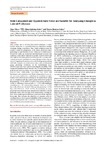Both Unopposed and Opposed Judo Tasks are Suitable for Analyzing Changes in Lateral Preference

Use este enlace para citar
http://hdl.handle.net/2183/23948Coleccións
- GI-PHG - Artigos [99]
Metadatos
Mostrar o rexistro completo do ítemTítulo
Both Unopposed and Opposed Judo Tasks are Suitable for Analyzing Changes in Lateral PreferenceData
2019-06Resumo
[Abstract] Judo coaches aim to develop left-handed techniques in righthanded judoka due to a potential frequency-dependent strategic advantage during competition. Thus, easily completed tasks are
needed to track the progression of the lateral preference index (percentage as right-handed actions). Thirty naïve volunteers performed
two tasks, an unopposed repetition-based dynamic task (yakusoku geiko) and an opposed-bouts task (randori), before and after eight-week training protocols differing in the executing side.
Training protocols consisted of a control group (without any instruction regarding the practice side), a bilateral group (practicing with both dominant and nondominant sides), and a nondominant group (practicing exclusively on the nondominant side).
ANOVA-type tests were used for analyzing the suitability of the unopposed repetition-based dynamic task for detecting changes in the lateral preference index and for analyzing the concordance between tasks. Additionally, concordance was tested with
Spearman's rank correlations and Bland-Altman plots. Lower lateral preference indices (i.e., reductions of executions as righthander) were observed after training in the nondominant group and in comparison with the control group and bilateral group on
the posttest (p < 0.05). ANOVA-test for concordance analysis revealed no differences between tasks (p > 0.05) with significant correlations (p < .05) and low bias during the pretest (ρ = 0.563; bias: 4.29, 95% LoA: -36.32-27.74%) and the posttest (ρ = 0.718,
bias: 0.69, 95% LoA: -39.37-40.77%). In conclusion, an unopposed repetition-based dynamic task detected reductions in lateral preference index after an eight-week nondominant training period. These results agreed with those observed with the opposedbouts
task. This indicates the eligibility of yakusoku geiko for
coaching delivery due to general suitability of the unopposed repetition-based dynamic task to track the maintenance or progression of left-handedness in judo trainees.
Palabras chave
Laterality
Judo
Motor learning
Skills acquisition
Lateralidad
Aprendizaje motor
Adquisición de habilidades
Judo
Motor learning
Skills acquisition
Lateralidad
Aprendizaje motor
Adquisición de habilidades
Versión do editor
ISSN
1303-2968





